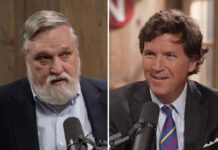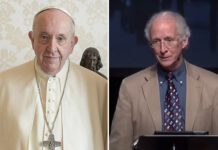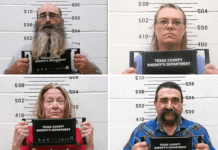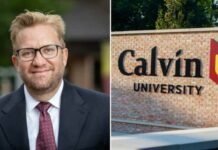This has been an enduring temptation for American Christians, and most recently by some evangelical leaders. Against this temptation, as with any idol, is consistently reflecting on whether our allegiance is first to Christ and his kingdom, and whether our rhetoric reflects this lordship. The best approach we should take is to consider the call to take the good news of Jesus to every person and to act in a way that helps reach your neighbor who holds a different political view. It’s hard for me to believe that what took place at FBC Dallas would appeal and connect with a self-identified Democrat who needs to hear the good news of King Jesus this Christmas season rather than a political message cloaked in religiosity.
Furthermore, I can’t imagine that a Christian from Malaysia would understand this strange service. As the congregation moved into chats of “USA! USA!,” I suspect she would have wondered if Christianity was really about Christ and His Kingdom.
Saving Christianity
In his address at First Baptist, Trump recalled the first time the pastor described him: “[Trump] may not know the Bible as well as all of us, but he loves God, he loves Jesus, and he’s a leader, and he’s going to lead us into great things, in helping and saving Christianity.”
This statement captures the crux of our problem.
Christianity doesn’t need to be saved, especially by any political party, military champion, or charismatic leader. That so many Christians—and far too many pastors—believe this is a disturbing reversal of the Christian faith we find in scripture.
When Jesus declared that he would build his church and that the gates of hell will not be able to stand against her, he was making clear that Great Commission did not depend upon any country or even religious liberty (as much as I love and believe in religious liberty and will work to defend it). So when Christians—evangelical or otherwise—invest our hope in worldly powers and people, we fail to see Jesus clearly and set ourselves up for loss and bitterness.
Lifeway Research found that 53% of pastors believe that sometimes their congregations love America more than God. This should be disturbing. Yes, there’s a lot to be grateful for as an American. For those who know me the best, know I’m deeply patriotic. I’ve led my family to read the Declaration of Independence every 4th of July. Still, we don’t need to go and sing, “I’m proud to be an American” as part of a congregational hymn.
And we certainly don’t need a hymn called, “Make America Great Again.”
Renewing Our Focus on the Mission
As followers of Christ, we are called to a standard of loving our neighbor (Mk 12:31) and treating others how we’d like to be treated (Mt 7:12). We have a mission (Mt 28:19-20) that supersedes our citizenship on earth—that should actually inform and guide our earthly citizenship.
Our current season of angst over declining political and cultural power is not unique to evangelicals. In this respect, I’m reminded of Michael Hamilton’s critical insight: “American evangelicalism is so tightly interlocked with American culture that cultural change will always stimulate religious change, and vice versa.”
The challenge, however, is that as evangelicals have responded to this cultural change, they have embraced a narrative of marginalization and the need for a protector. Rather than emboldening evangelicals to a renewed faith in the gospel of Jesus Christ and a focus on showing and sharing that good news, they have, as Michael Gerson noted, somehow convinced themselves that they are “an oppressed minority that requires a strongman to rescue it.” That strongman is Donald Trump. And the motivation, rather than love for God and man, is fear.
Truthfully, I get the angst. I understand change and transition—especially change and transition that one sees as bad—is tough on anybody. In both the OT and NT, the people of God struggled with good change and transition. And yes, overall, the direction our country is heading is not good.
But here’s my central concern. It seems evangelicals are convinced—both those that support and oppose the current administration—that the solution to our problems lies in political victory. When we let our anxieties and fears push us to political deliverance, we breed slavish devotion to a political party and leader rather than allegiance to the gospel. Over time, this will result in portraying any criticism of a political platform as treason to the religious identity. And if we aren’t careful, winning the lost will be replaced by winning elections.
It seems it already has, at least in the minds of many.
John Fea noted, “Despite the biblical passages exhorting followers of Christ to ‘fear not,’ it is possible to write an entire history of American evangelicalism as the story of Christians who have failed to overcome fear.”
We stand at the precipice of Christmas; the Advent season of waiting and longing is coming to close as we celebrate the coming of Christ. We celebrate because God, seeing our fear and powerlessness, stepped into the darkness to liberate, heal, forgive, and establish his eternal kingdom. This is captured in the angels’ proclamation in Luke 2:10-11, “Fear not, for behold, I bring you good news of great joy that will be for all the people. For unto you is born this day in the city of David a Savior, who is Christ the Lord.” Christmas does not dismiss our fear but points it to its true and enduring solution: Christ. And it is this Christ, according to Isaiah, who will establish a righteous government, put it on his shoulders, and rule forever and ever (Isaiah 9:6–7).
Merry Christmas. Let’s make much of Jesus in our lives, churches, and our hearts. He (alone) saves us.











